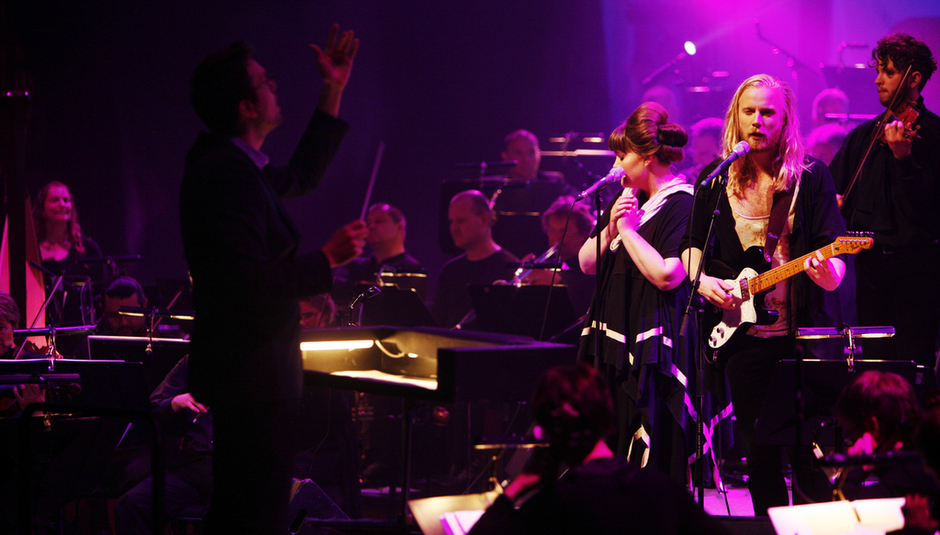The week or so prior to depature I'd been aware of Reykjavik seven-piece Hjaltalin and their debut record, Sleepdrunk Seasons. Aware that it was as promising as it was engaging and full of an array of textures and emotions, all rich. Their second record, Terminal, I was less familiar with. That's to say it was completely alien – I hadn't heard a note of it. Rare are the times that listening to a record is a process of discovery, and one not just of the artist but of their nature and...well...the record in its entirety.
There is a quality that Terminal has which Sleepdrunk Seasons doesn't – boldness and bombast and celebration of such. That's certainly not saying that the band's debut was encased in a thick, crusty shell of self-consciousness, just that it now seems like more of a warmup, a prelude. They've now found their voice and it is more resonant than ever. The opening drone of 'Suitcase Man' is used more like a warning siren than anything overtly musical.
On the evening I spoke to front-man and Hjalta-lynchpin Högni Egilsson he and his six cohorts were due to play the second of two concerts with the Icelandic symphony orchestra. For all Terminal's densely layered and varied tones, writing another 80-odd parts, turning their music genuinely orchestral sounds like it was as much hard work as it was fun, if not more. “It was hardcore,” he says with a slight wince.
The very specific musical direction and technical attributes predictably proved an obstacle, though. “You've got to prepare every little detail that's put on the sheet music. Every little thing that you want them to do, whether it's strange sounds on the violin – you have to notate it like 'press the bow hard' and 'turn the bow'. Of course it's a nightmare but it's also fun. It's fun to create but it's not fun to write music”. Not to the extent of being such a perfectionist, as a performance of this level needs.
Although these band vs. sinfonia type events are becoming ever more frequent, this also means it's easier than it should be to understimate the difficulty in translating and morphing a record which has been set in stone in its recording into a more organic and active beast. The noted but small change in their sound and approach from their debut to their current full-length means that a great variance exists, in tempo and tone - perfect for such a performance.
After even just a few words, it's not surprising that the band wanted to attempt something grander when making the new one. “That was our aim – we wanted to try something different and that's what we did, definitely. The first album was more fragile tonally, everything a little smaller in itself and the ensembles were smaller ensembles. For this we wanted a bigger sound, a big rock sound, a powerful sound – not this fragile naivety. I don't know if naivety is the right word, but a little understated, introverted.” Introverted it certainly is not, much like its primary creator.
Here is a man who could speak for Iceland. The whole of it. But, unlike its current most famous resident, he does not spew forth hot smoke and ash, being someone you could never really get bored listening to – even the most tangental points make a necessary statement and have relevance to something that was asked previously or indeed something that will be asked in the future. On a group trip two the foot of the Eyjafjallajökull glacier/volcano/mountain he was as much a tour guide as anything else, telling a – no exaggeration – twenty minute story of how Icelandic politics became so corrupted. He could have gone on for few more hours, you suspect.
Hjaltalin - Traffic Music from Hjaltalín on Vimeo.
As a man in my mid-twenties, I feel I'm approaching the sort of age where people of a similar age and younger are doing amazing things in various fields. I always remind myself of the fact that Lady Gaga was born just six days after me. What have I done? It may not be the most sensible or uplifting thing to think of when you're in a trough but today I'm reminded of this partially silly and partially inspirational self-imposed barometer again. Högni is 25 and it's humbling to be in the presence of someone who has had a major hand in producing two fantastic records and – as I would find out later – a man who was at the centre one of the most spellbinding and intricate performances I'd ever seen.
Interestingly and coincidentally enough, the conversation drifts to Miss Germanotta. Högni offers his own view of the cult of GaGa and her own version of “maximalism”: “That's such a phenomenal thing, besides the music or whatever, just the thought that 'let's do something really bold', not crazy and stupid but decadant and morally wrong and selling yourself to corporate dicks with sexual oblivion,” he glows. “She's dancing on a very thin line of morality and ethics but always doing it with grandeur and always in your high heels. It's a really sharp approach to culture. How far can postmodernism lead us? When are we going to stop?”
It's a fair point. The Icelandic tones and approach of Hjaltalin might be closer to the razor-sharp pop of GaGa than on first impression, certainly in approach. Nothing exists in a vacuum – although Iceland may be quite close in terms of actual isolation and scale – but a philosophical approach to music is a path they both appear to take, with little reservation. Yet, like many of us, he admits that a younger version of himself was more cynical, seeing things almost purely in black and white with no shades of grey. But, as ever, things change on the inside more than the outside.
“I used to have this approach to music and culture that one thing is wrong one thing is right – I haven't really been able to get that mentality going, I now embrace whatever. People just do stuff. But that was the one thing I really used to hate, the nature that everything is OK. It was the phrase that when you get older you begin to appreciate everything. I hope I'm not getting older I'm only 25!”
Hjaltalín from Inspired By Iceland on Vimeo.
The “Icelandic” issue is not something that should be overlooked, either. Cliches are oft resorted to, but as Olafur Arnalds said in his 2009 tour documentary, that very cliché that so much high-quality music is made in Iceland exists because it's actually true. The exaggeration is slight if existent at all. It's not something Högni denies, either:
“It's very fertile and the variety and the nature of not just being the local band next door. You've got these sections; one clique of downtown bands that think they're really cool and then you've got a clique of hip-hoppers and one of emo rockers. Maybe that's like everywhere, but it's fertile and a very carefree, careless atmosphere where people think 'let's just make fun and do something nice'.”
Not having the pressure of instant commercial success – or indeed the same song writing traditions as much of the UK and the US – is undoubtedly a factor in the appeal and quality of music emenating from this small island. Yet, it being just that, a nation of 320,000, eyes are always looking outwards, both East and West. Now, with the so-called banking crisis, there may have been a slight shift towards a different way of thinking. Not of earthquake proportions, but a small tectonic movement perhaps.
“I think people's focus on substance is much more than it was. After this crisis people have grown much more aware of things having content, it's the old cliché. It's about people not worrying about things that don't have to matter. You can be happy and you can be sad, but money doesn't really have an effect on it.”
The monetary aspect having receded, so has the idea of “making it” which seems wise. As is pointed out, for all the substance, how many Icelandic artists have truly “made it” outside of their homeland? Björk for sure and Sigur Ros, but other than that you're looking at artists a fraction of the size of those two.
“There is always this idea of making it. It used to be there. With the scenery now here in Reykjavik it's a little bit about not making it, about maybe just being able to play music for some people that is a valid thing. People are not afraid of being progressive in their music making,” Högni says, not that anybody had any concept of Icelandic bands as commercial and populist in their desires. This country's music is often caught up in its geography and comparisons with the shining lights are likely to be made and partly due to this, bands don't want to sound like other local bands, understandably enough.
“You don't want to make African progressive disco rock like Retro Stefson did last night. And you don't want to do folky country music like Seabear and you definitely don't want to do glacial Mogwai sounding music like Sigur Ros.” Pit this against the myriad of identkit indie bands of the UK and a feeling of embarassment creeps in, certainly for me. Yet the two aren't comparable and it's unrepresentative to take it too far but finding a niche of one has worked and continues to work well for the country's music industry. “Being different shouldn't be an oddity in itself. That should be a natural kind of state, that people should want to be different.” Still, an aim is for artists to get “out” of Iceland – after all there's only so much of a career that can be made with a third of a million people and reaching an ever-widening audience – or “a natural growth” in other words – is appreciated.
Help exists, however, not so much for them to make it, but to make music and play it across the world. The Nordic countries are notorious for their export embassies – this is something that can and often does give off the wrong impression, that these wealthy governments can hand out money left, right and centre, to all and sundry. Whilst some of the aid is financial, it is limited, and these musical embassies exist more to spread the word and slot the pieces into place, “making a connection here and there”.
And any connection for this band is vital, critical. They are good enough that you only need to see a small portion of what they do to realise how special their music is. The Icelanders who fill the hall on the Wednesday and Friday of the Sinfonia collaboration agree in great numbers. The ante-rooms hum with positivity and proudness both before, during and after their performance. The eternal daylight - if not actual sunshine - in Iceland at this time of year has an invigorating effect on the mind and body. The combination of this and the music is enough to make anyone fall in love with Reykjavik but it's the connection their music and presence makes with me during the three days that will stay forever.
Hjaltalin's new single, 'Sweet Impressions' is out now. They return to the UK and Europe to play in Autumn. You'd be a fool not to go and see them. An absolute fool!






















